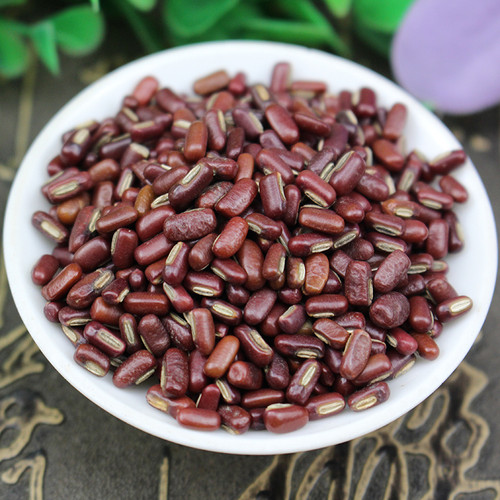Product Overview
Parts used: Fermented preparation obtain from the ripe bean
TCM category: Cool/Acrid herbs that release the Exterior
TCM nature: Cool
TCM taste(s): Bitter Pungent
Meridian affinity: Stomach Lung
Scientific name: Glycine max
Other names: Fermented soya beans, Dan dou chi
Use of fermented soybeans (Dan Dou Chi) in TCM
Please note that you should never self-prescribe TCM ingredients. A TCM ingredient is almost never eaten on its own but as part of a formula containing several ingredients that act together. Please consult a professional TCM practitionner, they will be best able to guide you.
Preparation: Take 70-100g of each mulberry leaves and sweet wormwood. Cook them in boiling water, filter and set water aside. Use the water to soak 1kg of soya beans. Then steam the beans, and let them dry for a few hours. Put beans in container with the mulberry leaves and sweet wormwood you previously used and leave is as such until fermentation starts. Get beans out, remove the mulberry leaves and sweet wormwood, put beans in closed container for 15 to 20 days. Remove the beans, steam them again and dry them.
Dosage: 5-15g
Main actions according to TCM*: Relieves the Exterior and scatters Wind, Cold and Heat, especially when there is Yin Deficiency. Relieves stuffy sensation in the chest and irritability.
Primary conditions or symptoms for which fermented soybeans may be prescribed by TCM doctors*: Headache Chest congestion Insomnia
Contraindications*: Mothers who are nursing should not use this herb as it may inhibit lactation.
Common TCM formulas in which fermented soybeans are used*:
For Wind-Cold-Exterior syndrome with headache and upper respiratory congestion combine fermented soybeans with scallions (Cong Bai), angelica roots (Bai Zhi) and fresh ginger (Sheng Jiang).
For irritability and insomnia that occurs after a prolonged fever combine fermented soybeans with cape jasmine fruits (Zhi Zi).
For high fevers with delirium and unconsciousness combine fermented soybeans with cape jasmine fruits (Zhi Zi), baikal skullcap roots (Huang Qin) and forsythia fruits (Lian Qiao).
For severe colds, flu or upper respiratory tract infections combine fermented soybeans with honeysuckle flowers (Jin Yin Hua), forsythia fruits (Lian Qiao), platycodon roots (Jie Geng), greater burdock fruits (Niu Bang Zi), wild mint (Bo He), lophatherum herbs (Dan Zhu Ye), common reed rhizomes (Lu Gen), liquorice (Gan Cao), notopterygium roots (Qiang Huo) and woad roots (Ban Lan Gen).
For Wind-heat with yin deficiency combine fermented soybeans with angular solomon's seal roots (Yu Zhu) and wild mint (Bo He).
Key TCM concepts behind fermented soybeans (Dan Dou Chi)'s properties
In Traditional Chinese Medicine (TCM), fermented soybeans are plants that belong to the 'Cool/Acrid herbs that release the Exterior' category. Herbs that release the Exterior aim to to treat the early stages of diseases that affect the upper respiratory tract, the eyes, the ears, the nose, the throat or the skin. TCM believes that External diseases such as colds or allergies can only invade the body if the External environment overwhelms our Wei Qi (the TCM version of the immune system). In order to counteract this invasion Cool/Acrid herbs aim to induce sweating by dilating our capillary pores so that they release more sweat. The belief is that this will expel the disease from the body and stop it from invading further.
As suggested by its category fermented soybeans are plants that are Cool in nature. This means that fermented soybeans tend to help people who have too much "heat" in their body, although with less effect than a plant that would be Cold in nature. Balance between Yin and Yang is a key health concept in TCM. Those who have too much heat in their body are said to either have a Yang excess (because Yang is Hot in nature) or a Yin deficiency (Yin is Cold in Nature). Depending on your condition fermented soybeans can help restore a harmonious balance between Yin and Yang.
Fermented soybeans also taste Bitter and Pungent. The so-called "five elements" theory in Chinese Medicine states that the taste of TCM ingredients is a key determinant of their action in the body. Bitter ingredients like fermented soybeans tend to have a cleansing action on the body by clearing heat, drying dampness and promoting elimination via urination or bowel movements. On the other hand Pungent ingredients tend to promote the circulations of Qi and body fluids. That's why for instance someone tends to sweat a lot when they eat spicy/pungent food.
The tastes of ingredients in TCM also determine what organs and meridians they target. As such fermented soybeans are thought to target the Stomach and the Lung. In TCM the Stomach is responsible for receiving and ripening ingested food and fluids. It is also tasked with descending the digested elements downwards to the Small Intestine. In addition to performing respiration, the Lungs are thought to be a key part of the production chain for Qi and the body fluids that nourish the body.
Use of fermented soybeans (Dan Dou Chi) as food
Fermented soybeans are also eaten as food. It is used as an ingredient in dishes such as Steamed prok ribs with fermented soybeans.








